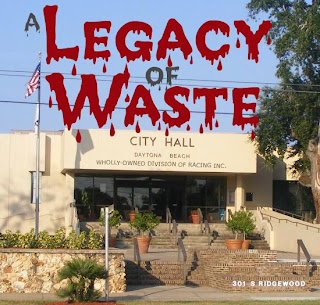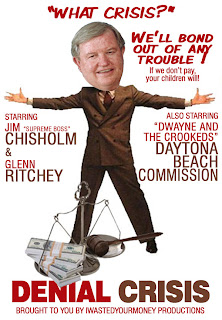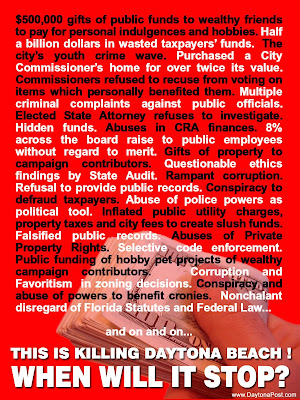The Paradox of Plenty: From the revenue boom to bankruptcy... Where is the money, Mayor Ritchey?
 DAYTONA BEACH, FL - During the period 2000-2007 Daytona Beach received an enormous increase in resource availability as a result of real estate property tax windfalls and tax increases.
DAYTONA BEACH, FL - During the period 2000-2007 Daytona Beach received an enormous increase in resource availability as a result of real estate property tax windfalls and tax increases.
The current dramatic slowdown in growth is paradoxical since Daytona Beach should have been posed for prosperity. Its income rose at a far higher rate than the demand for services. In any efficient corporation, this wonderful situation would have created a surplus for investment in improving the quality of life of its stakeholders as well as a cushion for a rainy day.
Instead, a legacy of benefiting only the politically-connected elite at the expense of the taxpayers continued and drained the windfalls.
These policies have led to corruption and cronyism, which have, in turn, hindered growth-enhancing investment, promoted the fleeing of talent to other cities and further buried Daytona Beach into a sandpit of mediocrity.Inefficient Public Investment... The pillaging of a city
The most severe costs of the corruption and more general rent-seeking are not necessarily the costs of bribes but the perpetual protection of inefficient capitalists by the city. If the city can ensure that emerging capitalists are efficient, it does not matter significantly for economic dynamism if bureaucrats and politicians make some illegal money in the process.
The real peril is when inefficient capitalists succeed in bribing and influencing the city to capture resources. When this happens, the cost to the local economy is much greater than the resources wasted in lobbying and corruption. The costs of subsidies permanently captured by influential industries that refuse or fail to grow up are likely to far outweigh the economic costs of bribery and corruption.
For this reason, clientelenism in the form of material benefits provided by a public official in exchange for political support and loyalty on the part of a client is so damaging. Such support can take the form of campaign financing, campaigning with the client's sphere of influence, utilizing corporate shells and affiliates to fund campaigns beyond the legal limits, indirect benefits such as use of private jets, free tickets and privileged treatment for special events, loans, free club memberships, free dinners and entertainment, access to privileged information and ultimately voting for the corrupt official.
This breeds dysfunctional rent-seeking, cronyism and corruption; and an increase in dynamic inefficiency of the economy. The case of Daytona Beach is a perfect real life example.
Another peril is the deterrent for honest businesses to invest or thrive in this atmosphere. If new businesses in any way compete either directly or for the sharing of resources against the public official's clients, they are faced with artificial obstacles, unreasonable zoning restrictions, selective zoning enforcement, usurious fees and even the abuse of police powers as retaliatory measures to keep their bounds.
The political repression based by government action which grossly discriminates against persons or organizations viewed as presenting a fundamental challenge to existing power relationships or key governmental policies has been a key element impeding prosperity in the city of Daytona Beach.
In Daytona Beach, the patronage has taken many corrupt forms. These include giveaways of public assets, the purchase of the client's goods, real properties or services, unjustified tax exemptions, below-market leases of public lands, selective zoning enforcement of their client's enemies' properties while overlooking the client's own violations, the utilization of police powers as retaliatory measures, employment opportunities in the public sector (hiring cronies regardless of skills), bond-funded giveaway incentives, untransparent granting of contracts and rezonings, and so on.
It is well known that Daytona Beach did not manage the sudden inflows efficiently, but...
Where's the money?
We can't ask City Manager, Jim Chisholm - he does not answer to anyone and openly stares down a submissive City Commission.
We can’t even ask the City’s Chief Financial Officer, Ricardo Kisner... he abruptly decided it was time to flee... and took a job elsewhere last year. (See Kisner unwelcomed in Glenview and Manager Defends Glenview’s New Finance Chief )
So, we ask Mayor Ritchey: Where did the money go? The need for drastic changes
In Daytona Beach, profound structural changes are urgently needed to alleviate problems caused by the highly concentrated, oligopolistic speedway-and-cronies-driven structure, low overall productivity growth and significant obstacles to free commerce and investment that have been cultivated over many years of government mismanagement and downright corruption.
The criminal prosecution of corrupt public officials is essential to gain back the trust of its citizenry. The State must intervene, Daytona Beach deserves a bright future.
Additional Reading:
You Can Stop Corruption in Daytona Beach - Join the Floodthelines Campaign
Corruption is killing Daytona Beach! When will it STOP?
Daytona Beach Job Woes Worsen
The News Journal coverage about the abusive salary practices of Daytona Beach public officials






